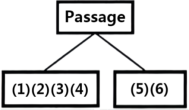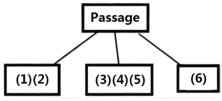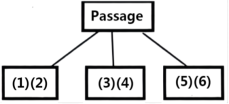1 . Parents have problems with their children. Every mother or every father wonders about something like “Why is this so? What can and should I do about it?”Strictly, what are these things that we parents call problems with regard to our children?
To a parent, a problem is some action, habit, or attitude that he doesn't expect, or he doesn't approve of, and that he tries to change but finds that he can't. So,whether it is dawdling (游手好闲) or any other everyday behavior in children,the parent calls it a“problem”. In reality, of course, parents and child specialists don't always agree on what is or isn't a“problem”But this disagreement doesn't make much difference to the anxious parent who feels so sure that he faces a problem.
I think common problems of young children can be grouped into four general categories: habit, management, expectation and adjustment. So, what are they really about? Four common types of problems: 1) Habit or training problems -those that have to do with establishing the fundamental habits of the children. 2) Child management problems -related to managing or controlling the child, directing his self-interest, and trying to get him to live agreeably and socially with other people around him. 3) Expectation problems -those that dealt with the child's learning to fulfill certain expectations. Some of these expectations arise in the parents' view of the child; some arise in the child's own thinking as he looks at the world and his place in it. 4) Adjustment problems—related to the child's sense of security and his emotional adjustment.
Why do these problems arise then? Partly, they arise out of the child's growing up, out of his need to be trained to fit into a world that just wasn't designed especially to meet his wishes. Partly, it is because the parent expects certain things from the child and figures that the child isn't meeting those expectations.
But no matter what causes the problem, it is most probably true that the parent's anxiety and distress are almost sure to increase the problem. For a child is something like a mirror, his behavior reflects the parent's concern about that behavior. That's why it is so important for us to understand why the child behaves as he does. Understanding is the first step in trying to manage a "problem". If you understand, you lose some of your anxiety. If you lose some of your anxiety, the child can relax and improve his behavior.
1. This passage was mainly written for______.| A.teachers | B.children |
| C.parents | D.specialists |
| A.Dealing with children's problems needs a calm mind |
| B.Parents and child specialists differ on the definition of a problem. |
| C.Parents sometimes find it difficult to solve the problems of their children. |
| D.Children are usually anxious to solve their problems with the help of their parents. |
| A.habit or training problems | B.child management problems |
| C.expectation problems | D.adjustment problems |
| A.Children haven't received proper treatment at school. |
| B.Parents don't know how to help their children. |
| C.Children haven't achieved their aims while growing up. |
| D.Parents have expected too little on their children. |
| A.introduce some children's problems and how to solve them |
| B.advise readers to understand children's problems |
| C.offer readers some ways to deal with children's problems |
| D.tell readers how to tell different children's problems |
2 . Many parents worry that showing negative emotions in front of their children will cause them to suffer. For example, children may end up thinking it's their fault or simply "catch" the emotion. Indeed, this worry has a sound basis — the phenomenon of “emotional contagion"(情绪感染)is real, and one recent study found that parents can transfer their fear of going to the dentist, for example, to their children.
On the other hand, there is the natural idea that we should “be real" with our children, and that they will benefit from watching a parent who struggles and eventually deals with their negative emotions like any other human being.
There are three concepts to consider when it comes to emotional display in front of children: suppression (压抑),"uncontained" expression, and talking about emotions. Suppression of emotion is when you hide the outward signs of an emotion. Unfortunately, it doesn't work very well — the act of suppressing your emotion actually increases your blood pressure. Observers can pick up on your distress despite your efforts to hide it, making them feel stressed. The recent research has also found that when parents feel negative emotions and keep them from their children, they experience lower relationship quality and decreased responsiveness to their child's needs.
On the other hand, “uncontained" expression of anger and sadness by the parent is also not salutary for the child. Uncontained means high intensity emotion, with no attempts to regulate or take ownership of it. Shouting, smashing (摔)things and blaming someone else for "making you angry" are all example of this .
So, what is the middle ground? That would be talking about emotion taking ownership of them and showing your child that you are trying to deal with them. Classic research found that six-year-old kids had better emotional understanding and perspective-taking skills if their mothers had talked to them about their emotions at the age of three. In fact, the more the mothers had talked, the better the outcome would be.
So next time you feel sad, angry or frustrated and your child is watching you expressing emotion, do explain what's going on in terms they can understand.
1. The author uses the example of going to the dentist mainly to _______.| A.explain parents' common fear |
| B.introduce the topic of negative emotions |
| C.show children may catch parents' emotions |
| D.present the consequences of transferring negative emotions |
| A.she will not make her kids feel stressed |
| B.she can hide her emotions from her kids |
| C.she will often shout at her kids for no reasons |
| D.she can't respond effectively to her kids' needs |
| A.Enough. | B.Beneficial. |
| C.Necessary. | D.Reliable. |
| A.To encourage parents to "be real" with our children. |
| B.To call on parents to develop a positive attitude to life. |
| C.To inform parents of the consequences of negative emotions. |
| D.To recommend parents to talk about negative emotions with children. |
A. | B. |
C. | D. |
After we all came to the conclusion that our family could responsibly care for a dog, my husband and I started our search at a local animal shelter.
We discovered a medium-sized male dog named Duke. This dog was approximately only two years old and seemed to have the sweetest character. He looked at us through intelligent eyes and already knew how to fetch a ball. My husband and I immediately adopted him Duke quickly fit into our family's lifestyle . And he quickly learned the tricks like “sit”,“stay”,and “come”.
But there was one skill that Duke could not seem to grasp — that of a watchdog. My husband was trying to teach him to remind us by giving a single warning bark when someone came into the yard. Duke would listen carefully to my husband's commands, but would cock (竖起) his head to one side in confusion and disappointment as if to tell his master that he just didn't understand what my husband was asking him to do. My husband would give his “watch” command. Duke would stand up -- muscles tightened in readiness, but would not have a clue as to what he was in readiness for.
One morning we heard the garbage collectors come up the driveway to get our garbage. My husband went to the open bedroom window so Duke could hear and see the men through the screen .
“Watch!” my husband commanded. Duke rose up in readiness, looked at my husband as sudden comprehension dawned on him, gave a quick tail wave, and leaped through the window screen, jumping happily out to greet the garbage men.
Seeing that, I couldn't help laughing. My laughter did nothing for my husband's mood when he found what was happening and he just went away to repair the screen with no expression on his face.
Duke brought our family so much fun. We never scolded or beat him. He was one of our family members.
1. What was Duke like when the author adopted him? (no more than l0 words)2. What did Duck learn after being adopted by the author's family? (no more than 15 words)
3. What is the meaning of the underlined part in Paragraph 5? (no more than 10 words)
4. How did the author and her husband feel about Duke's leaping through the window? (no more than 10 words)
5. How do you think people should treat their pets? (no more than 20 words)
4 . Trees play a special role in my life. They accompanied my growth, and my personal experiences and memories often
Out on the farm, my grandparents always cut a Christmas tree from the fields. They were always short. Those trees were a family
The pines in our backyard were only 1.5 meters tall when we moved in. They grew right alongside our kids, and in the same
A huge willow tree once
There is a sadness to a
My husband and I were working as newspaper photographers
Trees tend to be
The trees returned to Mount St. Helens -- and they returned
We’ve filled in the empty holes
One of the grandchildren asked how tall the new tree is.
“Not much taller than I am,” I said.
“Can we decorate it for Christmas?” she asked, eyes
The old trees may be gone, but the new one will soon become part of my grandchildren’s
| A.go together | B.come along | C.bring back | D.take down |
| A.see | B.find | C.picture | D.build |
| A.habit | B.tradition | C.culture | D.attraction |
| A.feel | B.sense | C.expect | D.recall |
| A.house | B.field | C.manner | D.way |
| A.with | B.between | C.out of | D.across |
| A.countless | B.countable | C.limitless | D.limited |
| A.planted | B.placed | C.stood | D.located |
| A.neighborhood | B.forest | C.backyard | D.garden |
| A.hollow | B.strange | C.rotted | D.fallen |
| A.which | B.that | C.when | D.while |
| A.possibly | B.comparably | C.suddenly | D.completely |
| A.encouraging | B.upsetting | C.moving | D.boring |
| A.symbols | B.associations | C.characters | D.contacts |
| A.harder | B.lower | C.easier | D.faster |
| A.regain | B.regrowth | C.recover | D.remark |
| A.told | B.warned | C.informed | D.reminded |
| A.when | B.where | C.which | D.that |
| A.observing | B.staring | C.twinkling | D.glancing |
| A.memories | B.programs | C.adventures | D.experiments |
5 . Believe it or not, there are times when you don't agree with your mother or even quarrel with her. Then what should you do?
Stay calm. It is normal that you feel sad and angry after quarrelling with her, but don't go and make big decisions like moving out, or running away from your home because not only will your friends and parents miss you , but it is dangerous for a teenager to do so.
Try to understand your mother. When your mom shouts and screams at you, she is not angry with you but she's disappointed about what you've done. This is because she cares a lot about you and doesn't want you to make bad choices which will do harm to your future. She is just trying to do you good. Remember it is never good to say "Mom I really hate you", because it has a bad effect on your relationship. Don't shout at your mom because she is your mother and she deserves respect from you. If you're angry with her, don't do things that would only make her angry.
Think of ways to get reconciled. After you quarrel with your mother, wait until she cools down a bit and if you dare not to speak face to face with her, find another way to approach her, for example, write a letter to her. By and by, you will find chances to talk to your mother. You should apologize to her first for your bad attitude and then tell her what you are thinking in your mind in a very polite way.
1. What is the main idea of the passage? (No more than 15 words)2. What does the mother mean when she is screaming at her kid? (No more than l0 words)
3. What should you do first if you find a chance to talk to your mother after your quarreling? (No more than l0 words)
4. Please replace the underlined part in English. (No more that 5 words)
5. What do you usually do after you have a quarrel with your parents? Please explain it. (No more than 25 words)
6 . Grandparents Answer a Call
As a third-generation native of Brownsville, Texas, Mildred Garza never planned to move away.Even when her daughter and son asked her to move to San Antonio to help with their children, she politely refused.Only after a year of friendly discussion did Ms.Garza finally say yes.That was four years ago.Today all three generations regard the move as a success, giving them a closer relationship than they would have had in separate cities.
No statistics show the number of grandparents like Garza who are moving closer to adult children and grandchildren. Yet there is evidence suggesting that the trend is growing.Even President Obama’s mother-in-law, Marian Robinson, has agreed to leave Chicago and move into the White House to help care for her granddaughters. According to a study by grandparents.com, 83 percent of the people said Mrs.Robinson's decision will influence grandparents in the American family.Two-thirds believe more families will follow the example of Obama’s family.
“In the 1960s we were all a little wild and couldn't get away from home far enough or fast enough to prove we could do it on our own,”says Christine Crosby, publisher of Grand, a magazine for grandparents. “We now realize how important family is and how important it is to be near them, especially when you’re raising children.”
Moving is not for everyone. Almost every grandparent wants to be with his or her grandchildren and is willing to make sacrifices, but sometimes it is wiser to say no and visit frequently instead.Having your grandchildren far away is hard, especially knowing your adult child is struggling, but giving up the life you know may be harder.
1. Why was Garza’s move a success?| A.It strengthened her family ties. |
| B.It improved her living conditions. |
| C.It enabled her to make more friends. |
| D.It helped her know more new places. |
| A.17% expressed their support for it. |
| B.Few people responded sympathetically. |
| C.83% believed it had a bad influence. |
| D.The majority thought it was a trend. |
| A.They were unsure of themselves. |
| B.They were eager to raise more children. |
| C.They wanted to live away from their parents. |
| D.They had little respect for their grandparents. |
| A.Make decisions in the best interests of their own. |
| B.Ask their children to pay more visits to them. |
| C.Sacrifice for their struggling children. |
| D.Get to know themselves better. |



